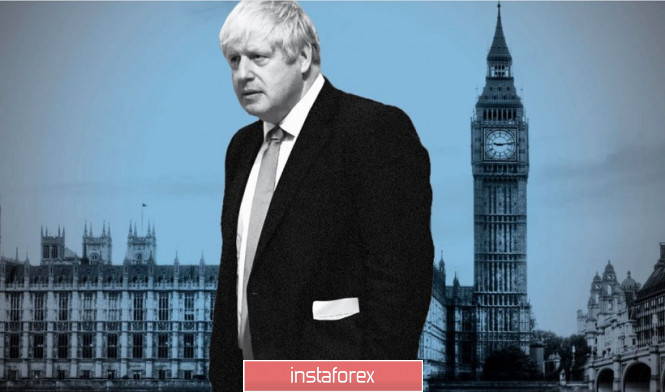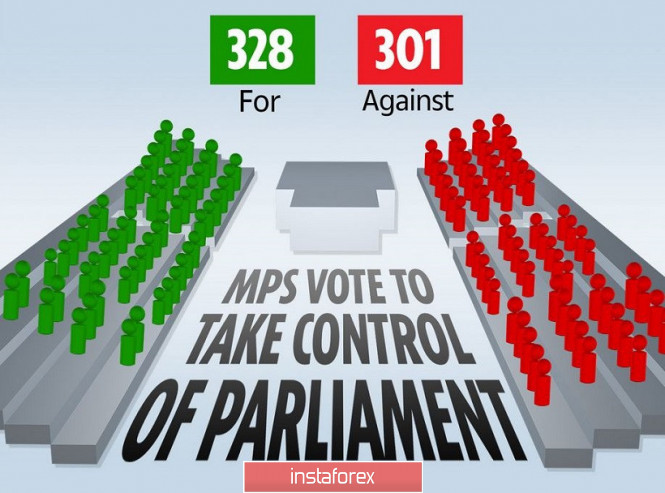The British currency slumped to a 34-year low against the dollar yesterday, that is, to the level of 1.1958. The pair was in this price area back in January 2017 (when Theresa May's first attempt to approve the deal in Parliament failed), but then the low was set at 1.1986. This time, the GBP/USD bears tried to gain a foothold in the 19th figure, however, the fundamental background for the pair is now very volatile, so the price returned to its previous positions in the second half of Monday, and more precisely - to the boundaries of the 21st figure. But yesterday's price fluctuations were, so to speak, "practice," since key decisions in the House of Commons should be made today.

By and large, political events unfold along a predicted trajectory. Many analysts were confident that MPs will not leave without proper reaction legal maneuvers Boris Johnson to block the work of the House of Commons. Although the prime minister himself denies the claims against him, almost all the deputies are confident that he is thus trying to paralyze the legislature in order to independently make decisions regarding the prospects of Brexit. His plan is obvious: Brussels must seriously take the threat of the chaotic Brexit in order to finally make concessions to London. And in order for this threat to be taken seriously, it's necessary "on all sails" to lead the country out of the bloc, imposing on Europeans the idea that the deal is necessary primarily for the European Union, and not Britain.
In other words, the prime minister is bluffing to a certain extent, but this "nerves game" is very risky, especially considering Brussels's rather tough stance on key issues of the deal (for example, back-stop). Therefore, the Parliament plays the role of a "stop-crane" in this situation, preventing catastrophic consequences of a dangerous political game. Although, according to Johnson, the House of Commons, by its liberal approach, only weakens London's position in the negotiation process - they say, why should Europeans make concessions if they are confident that the British side will either ask for another postponement, or ultimately agree to the proposed conditions ( or cancel Brexit by a new referendum)?
That is why, in his speech yesterday, Johnson unambiguously hinted: if the deputies will "put the wheels in motion,'' he will initiate early elections, which (most likely) will take place on October 14th. Given the latest opinion polls, not all political forces represented in the current convocation of the House of Commons are eager to go to the re-election. In theory, this threat to the head of government should act on MPs accordingly. But contrary to the arguments voiced, it can be assumed that today, the deputy corps will still block the "hard" Brexit on October 31. We are talking about a bill that was registered yesterday, which is designed to prevent Britain from leaving the European Union without a deal.
The document, in particular, assumes that members of the British government are obliged to take "all possible actions" to reach a new agreement with the European Union at a meeting of the European Council on October 18. If the parties fail to reach a compromise, then the prime minister has the right to send a request to the House of Commons on October 19 about the possibility of leaving the European Union without a deal. This paragraph of the bill suggests that a hard Brexit will be possible only with the approval of the deputies of the British Parliament. Also, the head of government will be obliged to ask the European Union to prolong the negotiation process for three months, that is, until January 31, 2020, or to agree to any date proposed by Brussels.
Actually, the whole essence of the bill is contained in one paragraph. Parliament prohibits the implementation of a harsh scenario without the permission of lawmakers. All other norms of the bill are formal in nature, since in such conditions Brussels will not agree to revise the text of the deal, thereby "agreeing in absentia" to the extension of the negotiation process.
And although many analysts predicted the appearance of such a bill, until yesterday, it was not clear whether it would be supported by deputies or not, because the opposition does not have a majority, so they have to rely on Conservatives as well. But yesterday's events showed that the Parliament is quite determined.
Firstly, the deputies "took away" the right to determine the agenda from the Cabinet of Ministers, which happens quite rarely in the walls of the House of Commons. Secondly, last night, they put on the agenda the above bill - 328 deputies voted for it, 321 against it. The advantage, though not devastating, but significant. Thirdly, a momentous event occurred yesterday - prominent Conservative deputy Philip Lee took the side of liberal democrats. This means that the prime minister no longer has a "working majority" in the House of Commons. Lee explained his action by saying that he could not serve the interests of the British in the ranks of the Conservatives. However, many Conservatives are also ready to support opposition initiatives without leaving the party ranks. According to preliminary data, from 20 to 40 Tories intend to vote against hard Brexit. The threats of expulsion from the Conservative Party did not affect them.

Thus, today (or in the coming days) the Parliament is likely to block the implementation of the hard scenario, and in turn, Boris Johnson initiates early elections to be held. However, not everything is so simple in this matter. The fact is that to permit the holding of general re-elections, two-thirds of the votes in the House of Commons are needed. Deputies fear that having satisfied this request, the Cabinet may postpone the election date to any other date after October 31. Therefore, many deputies have already expressed an ultimatum - at first the House of Commons passes a law blocking a hard Brexit, and then proceeds to the issue of early re-election. At the same time, Johnson can initiate a vote of confidence in the government (in this case only half of the votes of the parliament are needed) - but in this case, the prime minister risks making a "blank shot".
In other words, the coming days for the British currency will be saturated. Judging by the preliminary moods of the deputies, the upcoming events will support the pound. In such conditions, the GBP/USD pair can reach 1.2290 (the upper line of the Bollinger Bands indicator on the daily chart) in the short term - the pair has not risen above this resistance level since the end of July.
The material has been provided by InstaForex Company - www.instaforex.com